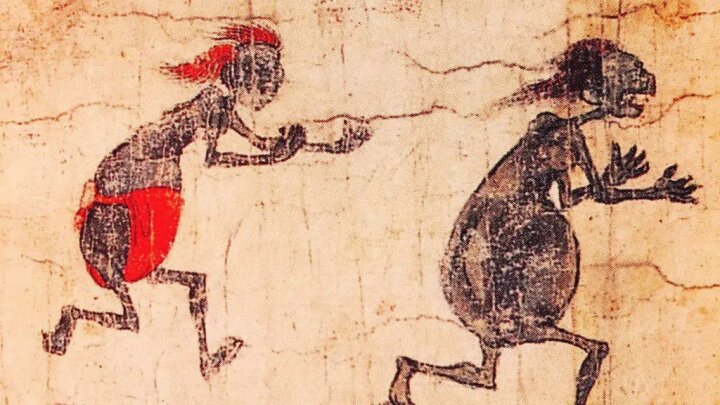The Six Realms
In traditional Buddhism six realms are recognised. The realms of Hell, hungry ghosts, animals, asuras, human beings, and heavenly beings.
Once again, in traditional Buddhism we transmigrate through these realms according to our karma/acts/thoughts.
(Nirvana is not "heaven")
Whether or not these realms actually exist after death, they certainly exist within human society and inside each of us.
"Hell is when people live together and make each other suffer. Everything each one does irritates the others. This sort of thing often happens even within ourselves: two conflicting parts of us argue and fight. We have a constant internal struggle. That’s hell"
Hungry ghosts are beings consumed by unsatisfied craving. Usually they are depicted in Buddhist symbolism as fat bellied beings with very slender necks!
Animals are happy when they are fed; they feel content and go to sleep, while others are made to work, work, work.
Asuras are fighting spirits. When we believe we are right, we criticize others based on our own concept of justice. If necessary we fight with others until we win. Exterminating people who oppose us becomes the purpose of our lives. Asura cannot be satisfied without enemies.
Human beings seek fame and profit. Animals are satisfied when their stomachs are full, but we with our human minds are never full, because we think of our future.
Heavenly beings are those whose desires are completely met. They need nothing; they seem happy, and yet they are not.
Many modern Buddhists relate all this to the changing moods and emotions of our daily lives. Each day we can "visit" each realm. A revolving wheel.
How to escape the wheel?
Once again, in traditional Buddhism we transmigrate through these realms according to our karma/acts/thoughts.
(Nirvana is not "heaven")
Whether or not these realms actually exist after death, they certainly exist within human society and inside each of us.
"Hell is when people live together and make each other suffer. Everything each one does irritates the others. This sort of thing often happens even within ourselves: two conflicting parts of us argue and fight. We have a constant internal struggle. That’s hell"
Hungry ghosts are beings consumed by unsatisfied craving. Usually they are depicted in Buddhist symbolism as fat bellied beings with very slender necks!
Animals are happy when they are fed; they feel content and go to sleep, while others are made to work, work, work.
Asuras are fighting spirits. When we believe we are right, we criticize others based on our own concept of justice. If necessary we fight with others until we win. Exterminating people who oppose us becomes the purpose of our lives. Asura cannot be satisfied without enemies.
Human beings seek fame and profit. Animals are satisfied when their stomachs are full, but we with our human minds are never full, because we think of our future.
Heavenly beings are those whose desires are completely met. They need nothing; they seem happy, and yet they are not.
Many modern Buddhists relate all this to the changing moods and emotions of our daily lives. Each day we can "visit" each realm. A revolving wheel.
How to escape the wheel?





